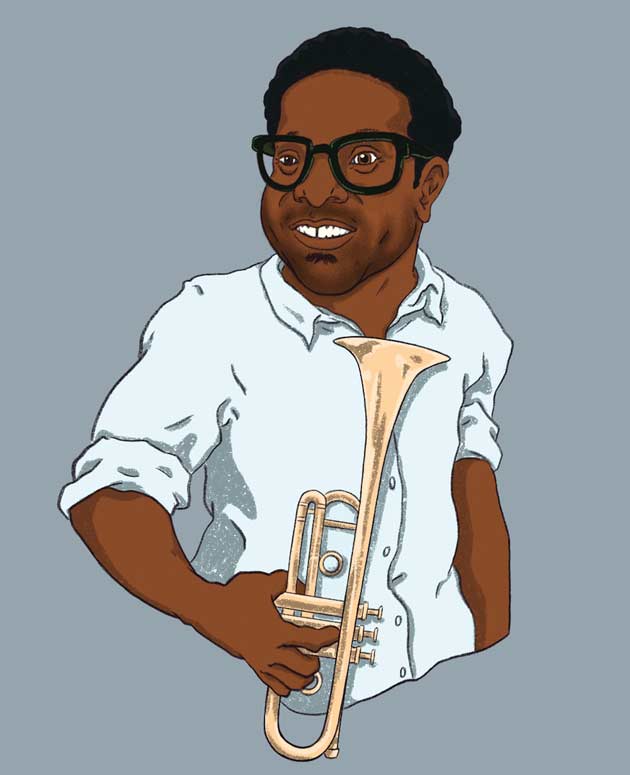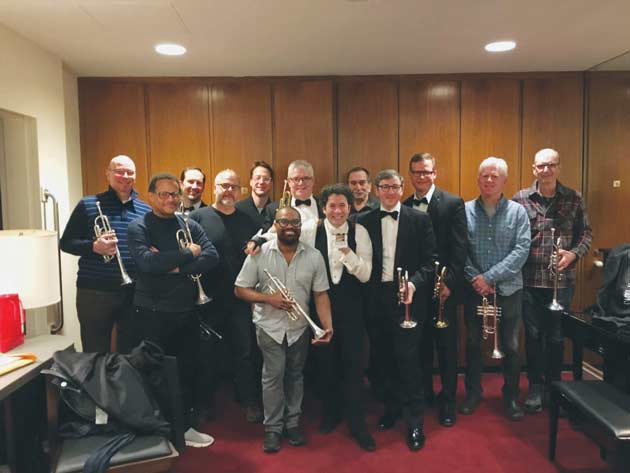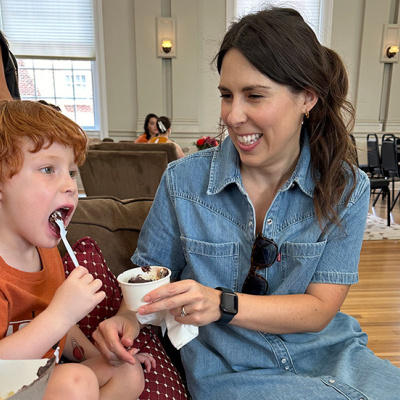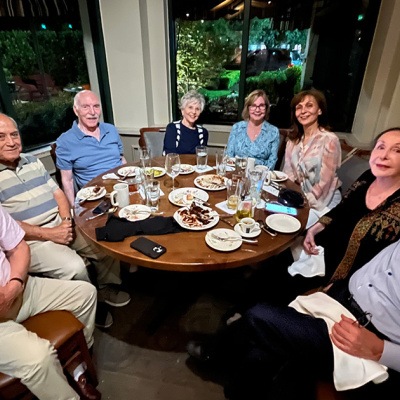Renowned Trumpeter Billy Hunter Joins the UT Faculty

Many college professors are struggling with distance learning this fall. Between technology issues and wrestling with the ways in which different students best learn through a screen, the challenges are paramount. It’s perhaps even more arduous for Billy Hunter.
Principal trumpet in the Metropolitan Opera Orchestra since 2004, Hunter joined the Butler School of Music faculty beginning this semester. He’s teaching Applied Trumpet, but because of the pandemic, he’ll be instructing remotely from New York City.
“For us musicians, it’s always best to do face-to-face,” he says. “But there are so many issues, like the aerosols that leave the bell and float around.”
So he logs on from the Upper West Side apartment he shares with his four kids, wife, and her parents, to instruct students he has never met. Eventually, he says, he and his family will start house hunting in his hometown of Austin.
Hunter, BM ’97, grew up on Austin’s East Side, on Martin Luther King Jr. Boulevard. He’d spend hours in front of the television, bopping along to MTV and forming a love for music, but it was a few screaming high notes from Maynard Ferguson that changed his life. He was in sixth grade at O. Henry Middle School in the mid-’80s when the school’s assistant band director played him a recording of the big band trumpeter, which made him want to play the instrument. He started practicing day-in, day-out.
In the summer, he got demoted to the garage because he was trying to hit Ferguson’s high notes for up to five hours every day. Despite the lack of air conditioning, he was determined to do it.
“I would eat breakfast, my mom would go to work, and I would go into the garage and play for hours until I couldn’t take the sweat,” he says. “I’d eat lunch and play again. Every day, the same thing.”
By the time he reached high school, it was apparent that he’d need private lessons to really advance. Hunter was already behind, as most kids who were serious about their instruments had begun with a tutor, but his family couldn’t afford that. Then he met Gary Faust, his school band director with a propensity to do whatever it took to get his students the best education. He would drive Hunter to and from band practice when he couldn’t get a ride, and, toward the end of Hunter’s high school years, he paid a private tutor to give him lessons.
“I was like a sponge,” Hunter says. “I realized I was at a disadvantage. I had to work really hard to make it, to get on the level.”
Hunter considered multiple colleges, but a scholarship, plus the ability to study under Raymond Crisara—a renowned performer who was once principal trumpet of the Metropolitan Opera Orchestra—sealed the deal.
During his freshman year, in 1992, a graduate trumpeter named Todd Hastings, DMA ’98, walked into the trumpet studio to find a new kid playing the “Hummel Concerto.” “He had this junky trumpet, but the most beautiful sounds came out,” says Hastings, now a professor of trumpet at Pittsburg State University and Hunter’s close friend, “Not only could he play the machine really well, but he was mature beyond his years musically.” The doctoral students looked at each other in awe as Hunter played the piece flawlessly.
Hunter decided he would apply to only the best graduate schools; if he didn’t make it, it wasn’t meant to be. He worked at H-E-B part-time throughout college, and as he neared graduation, they offered him an administrative position. He figured if he didn’t get into a top-flight performance school, he’d get his MBA and go into business.
Hunter aced his audition at Julliard. David Gordon, now principal trumpet of the Seattle Symphony Orchestra, says that Hunter’s reputation preceded him when he arrived in New York City, even among a packed class of brass players. Gordon, an undergrad when Hunter arrived for graduate studies, could hear that Hunter was a fantastic player. But as the two grew close, picking up entry-level freelance orchestral gigs around New York, Gordon also saw a man full of kindness and empathy.
“Billy, for me, makes an argument for cloning humans,” Gordon says. “The world would be a better place with more Billies in it.”
After graduation, Hunter landed in Miami, where he played in the New World Symphony. But after a couple of years, he found himself in a rut, having auditioned upward of 30 times for various orchestras. That’s when he discovered meditation, which reeled him in mentally. He scaled down his playing, relaxed his mind during auditions, and saw results immediately. In 2003, he flew to Baltimore to audition for the Baltimore Symphony Orchestra. The same day, his identity was stolen and he was out of cash. He took a free shuttle to a hotel, prayed one of his credit cards would work, woke up the next morning, and played the best audition of his life.
“The whole time I used meditation,” Hunter says. “I didn’t freak out. It was an amazing experience.” Two weeks later, he nailed his MET Opera Orchestra audition, becoming principal trumpet.

Weston Sprott, a trombonist in the MET Opera Orchestra and professor at Julliard who has known Hunter for almost 20 years, says that meditation is what keeps Hunter even. First trumpet players, because they often play the melody in brass sections and quintets, sometimes carry the stereotype of being arrogant. Sprott says that Hunter is the opposite.
“He’s a very humble person,” Sprott says. “He’s also an open, democratic leader. If you have an idea, Billy’s default is to try to find a way to make that work, to incorporate your idea into what the group is doing. He leads by example with his playing.” Those qualities, Sprott says, will make him a great educator at UT, adding that for Black trumpet players—of which there are so few, percentage-wise—seeing someone in an authority position will move the needle for diversity and inclusion. Hunter tells me that he’s already working behind the scenes to diversify the Butler School, from student population all the way up to administration.
“I think his presence on campus will be very important,” Sprott says. Students are going to look on UT websites or go to recruiting events and say, ‘Wow, there’s an African-American professor of trumpet at UT. This person played principal trumpet at the MET. This is something to aspire to.’”
Hastings says that just having Hunter at the Butler School is an incredible recruiting tool based on the respect Hunter garners in the music world. He already has a star student he’s ready to send Hunter’s way once he finishes undergrad.
“That studio is going to be smoking,” Hastings says. “UT made the right move.”
Illustration by Courtney Williamson






